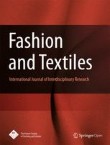Fashion and Textiles is affiliated with The Korean Society of Clothing and Textiles
The relationship between color cycles in home furnishings and apparel, 1969–2009
Fashion is visible in many product categories; color can be an important component in consumers’ product selection decisions. The current phenomenon of fast fashion suggests color cycles have shortened and ove...

